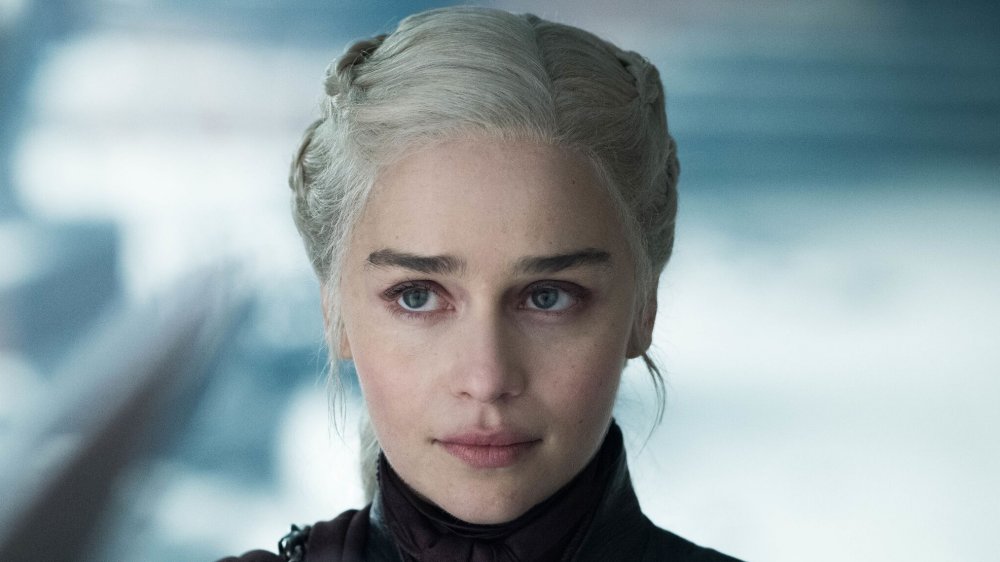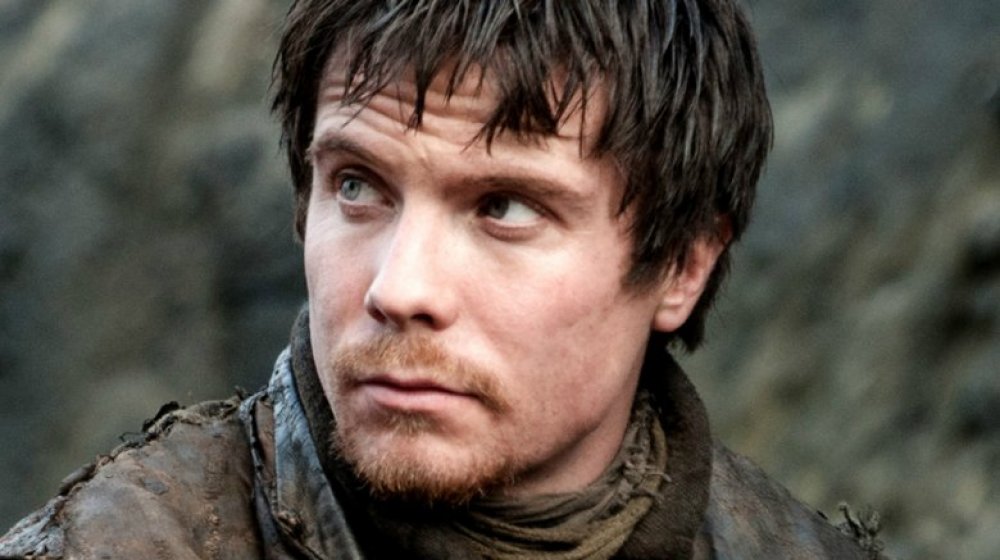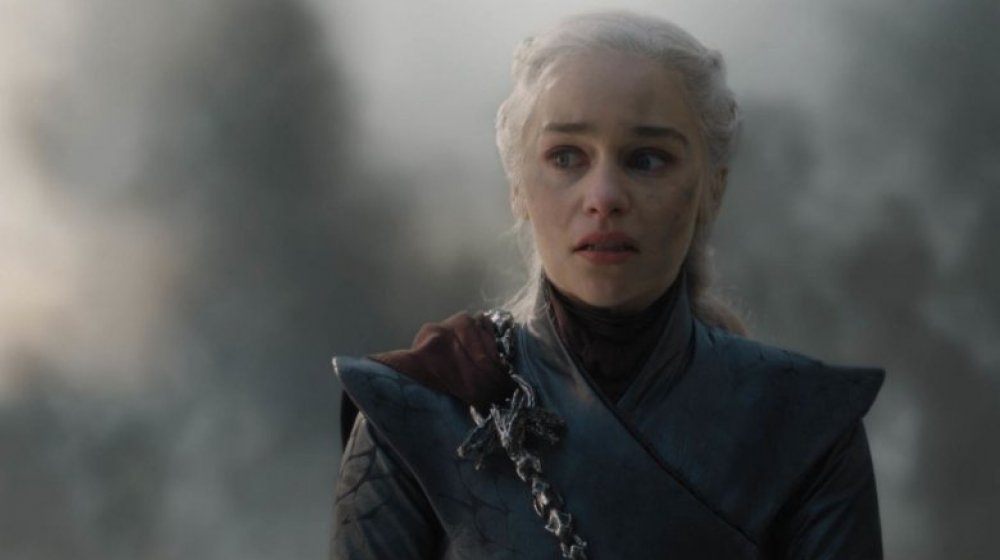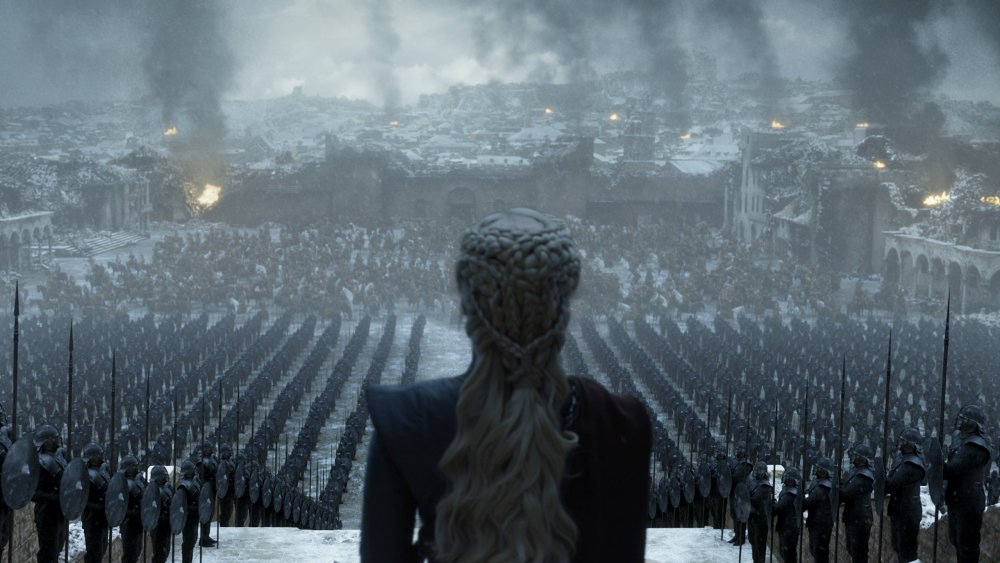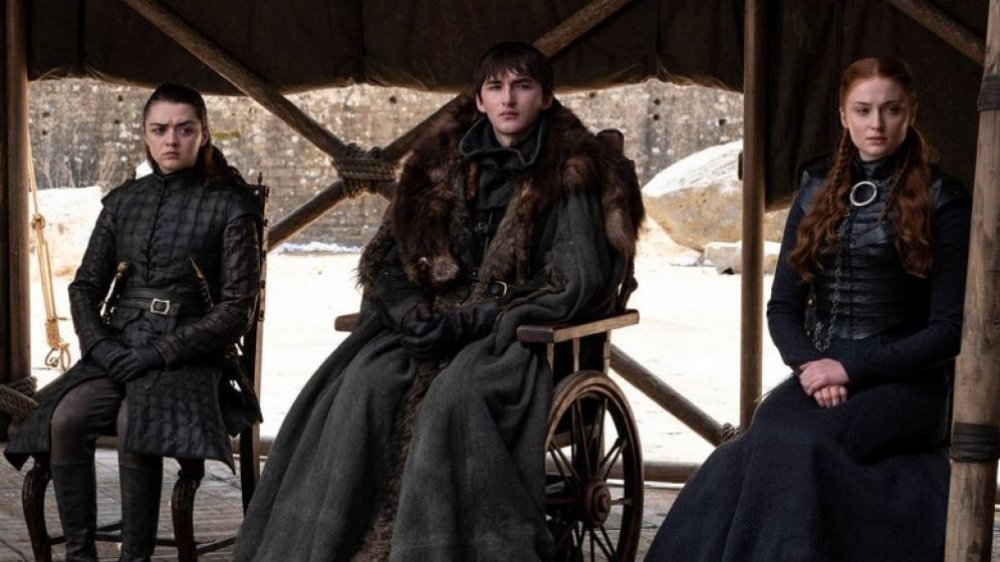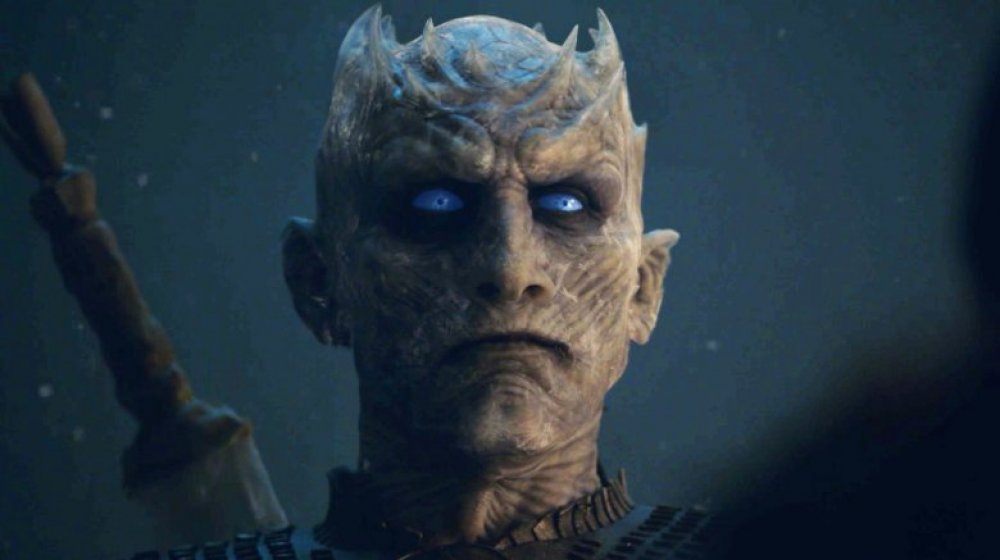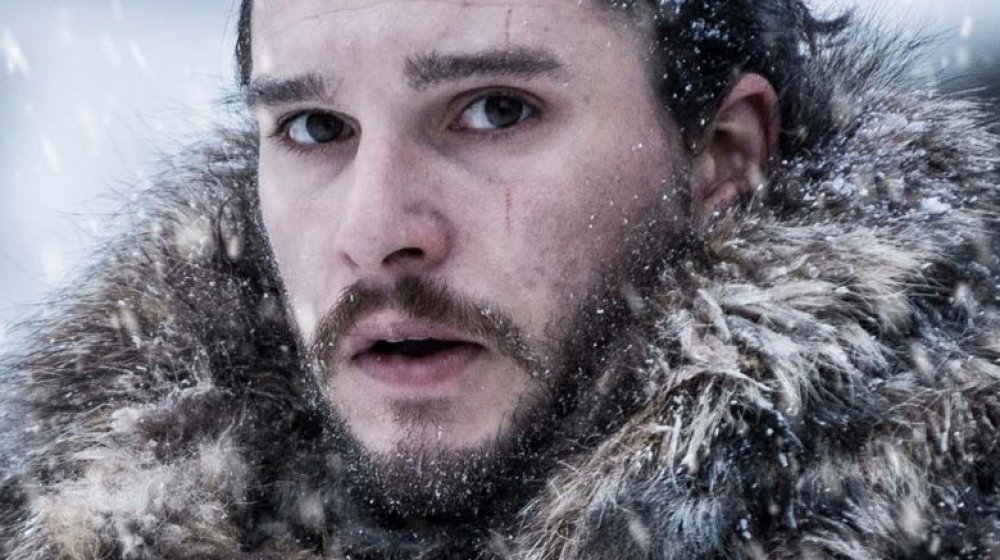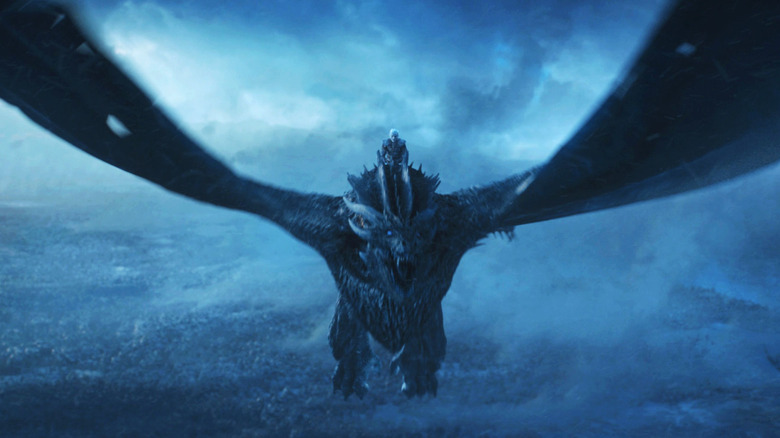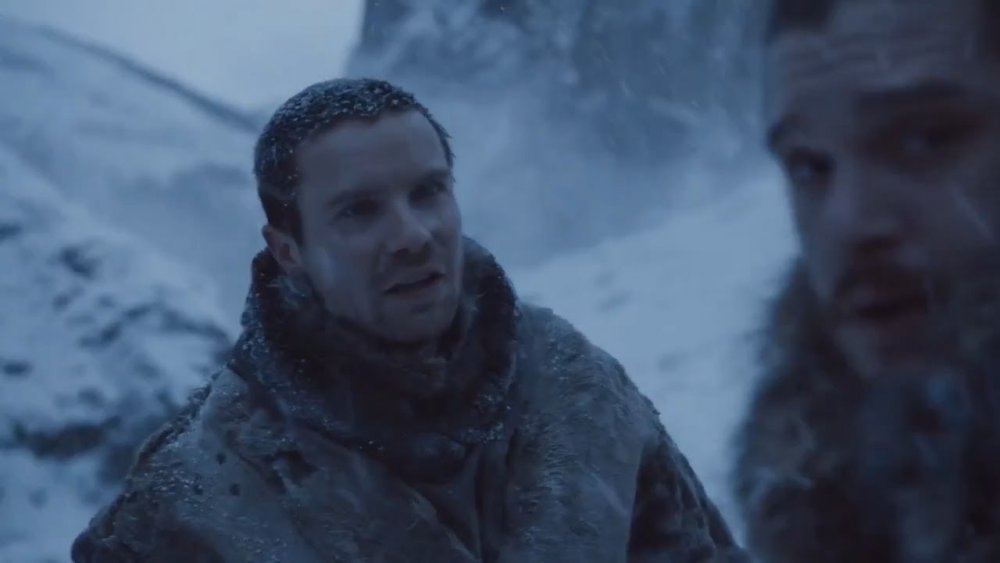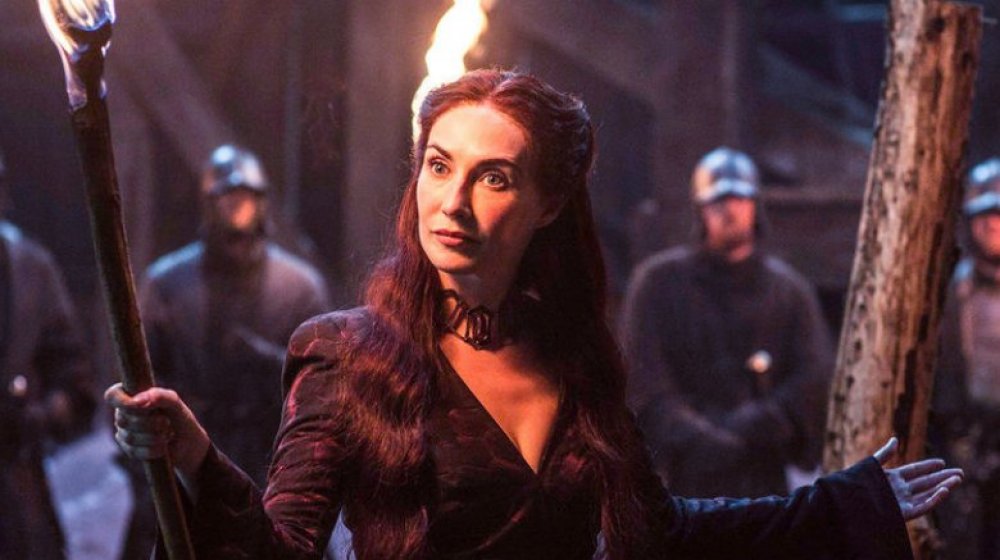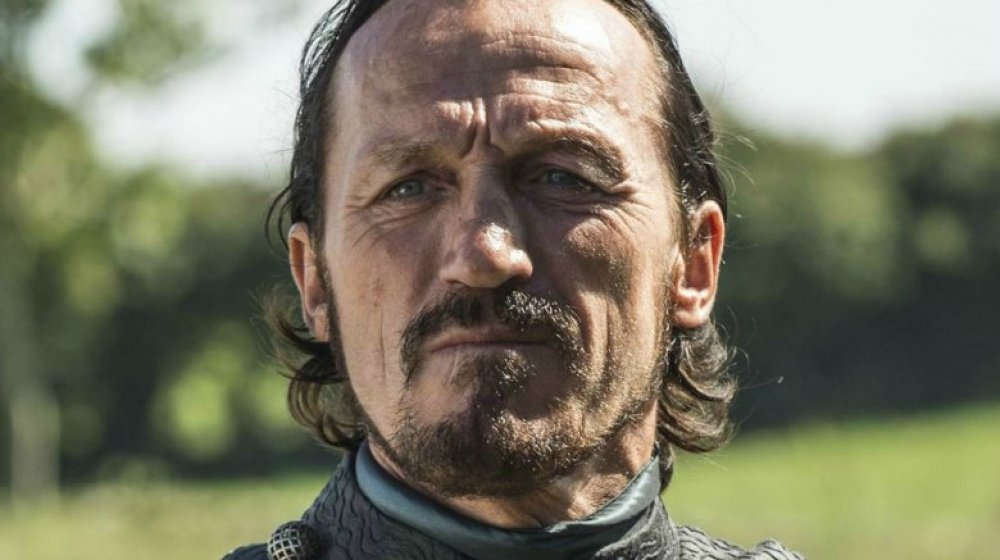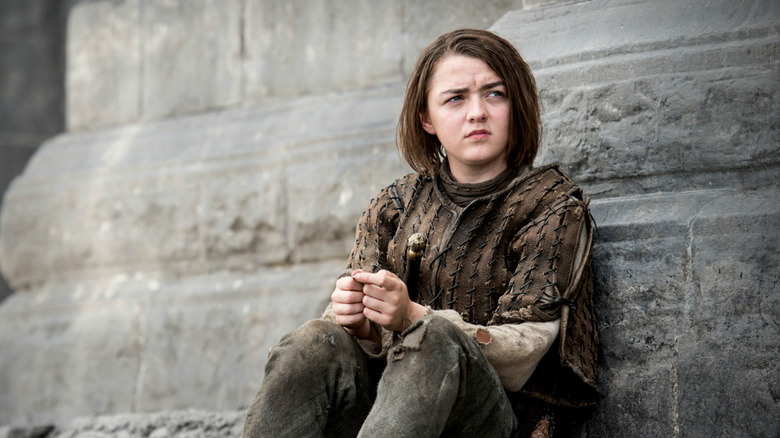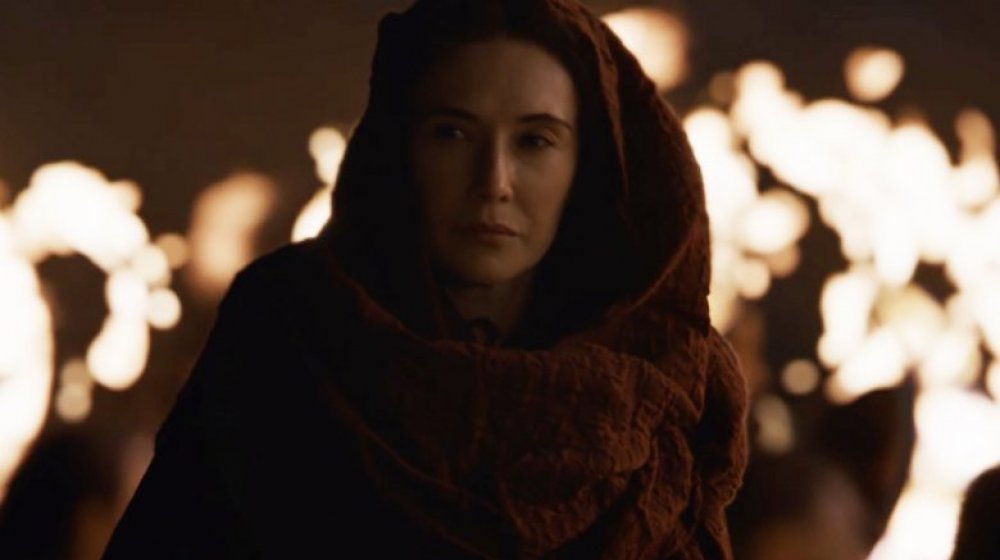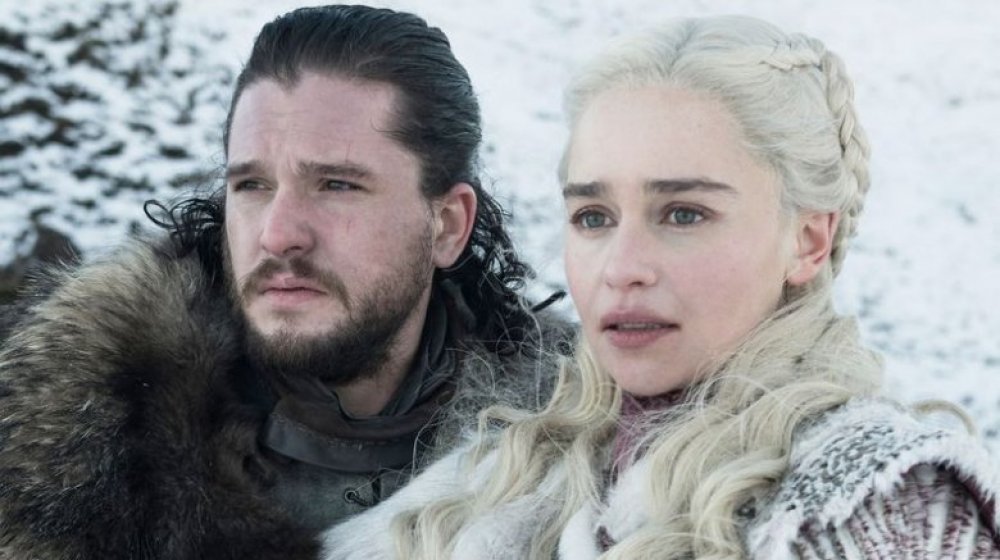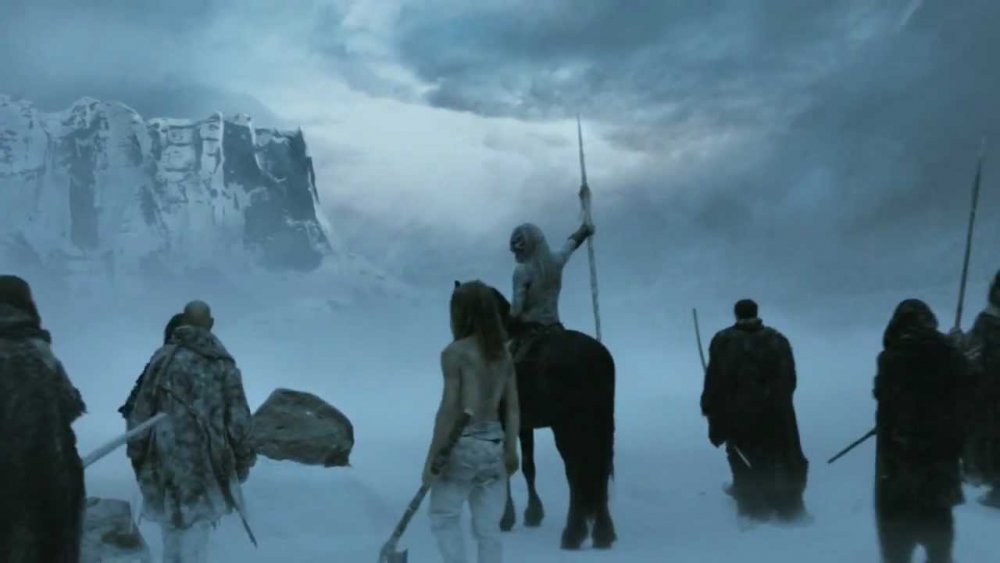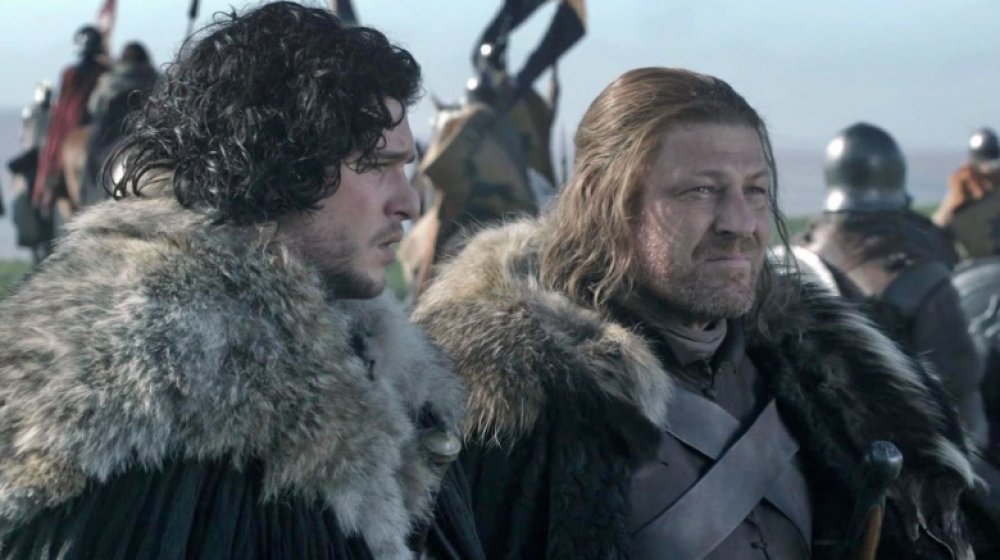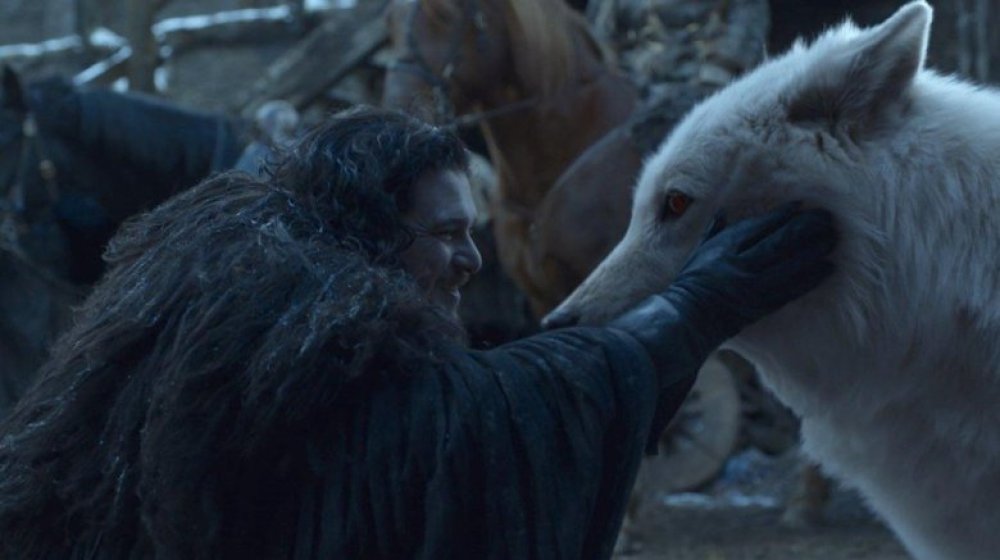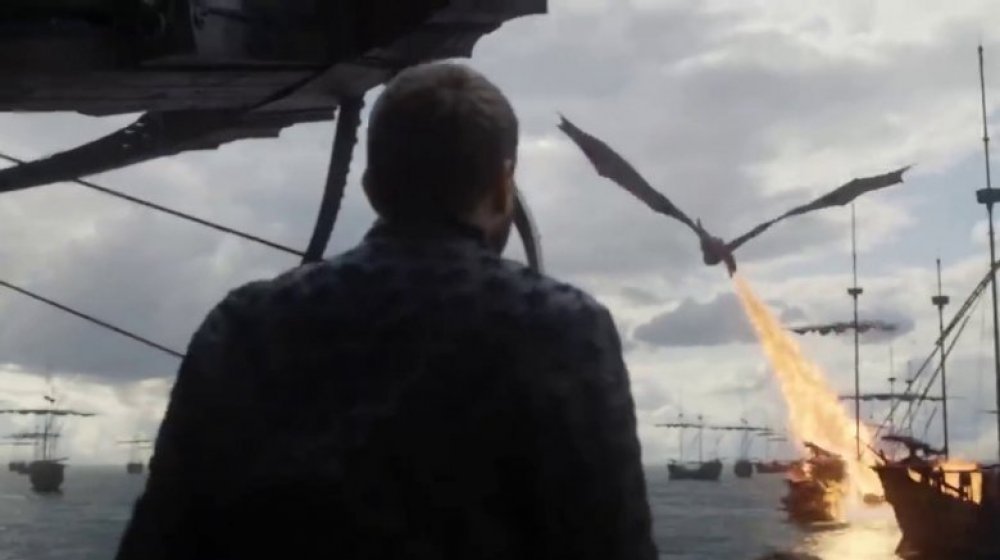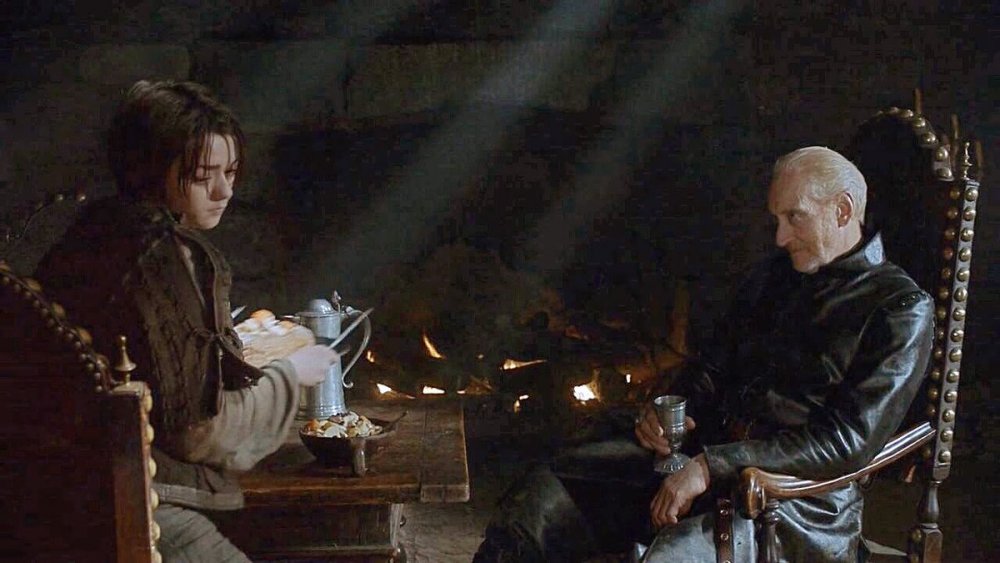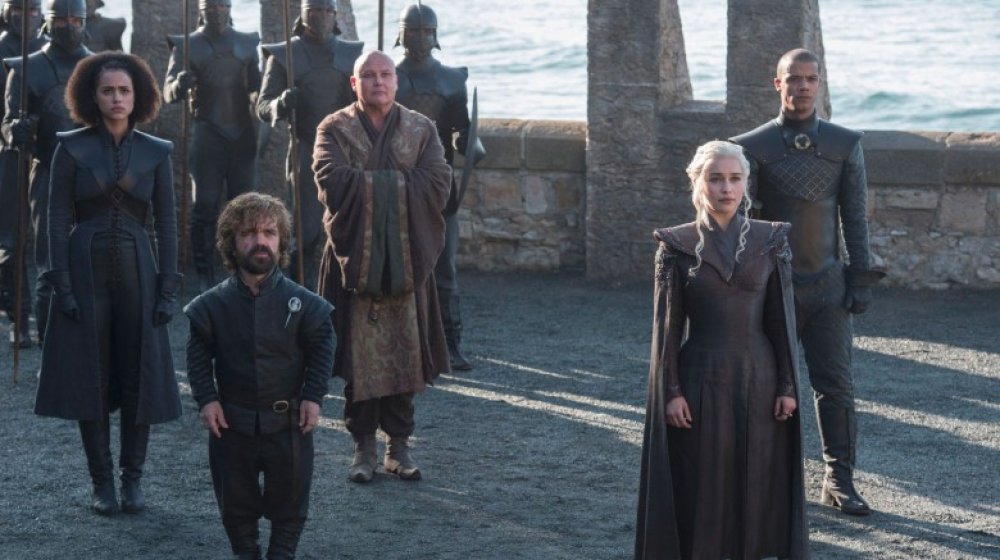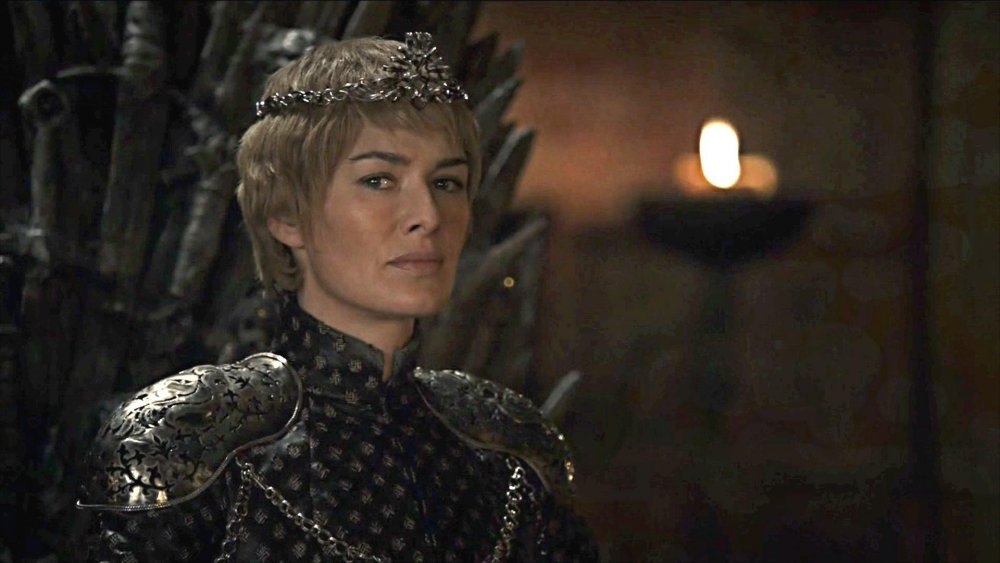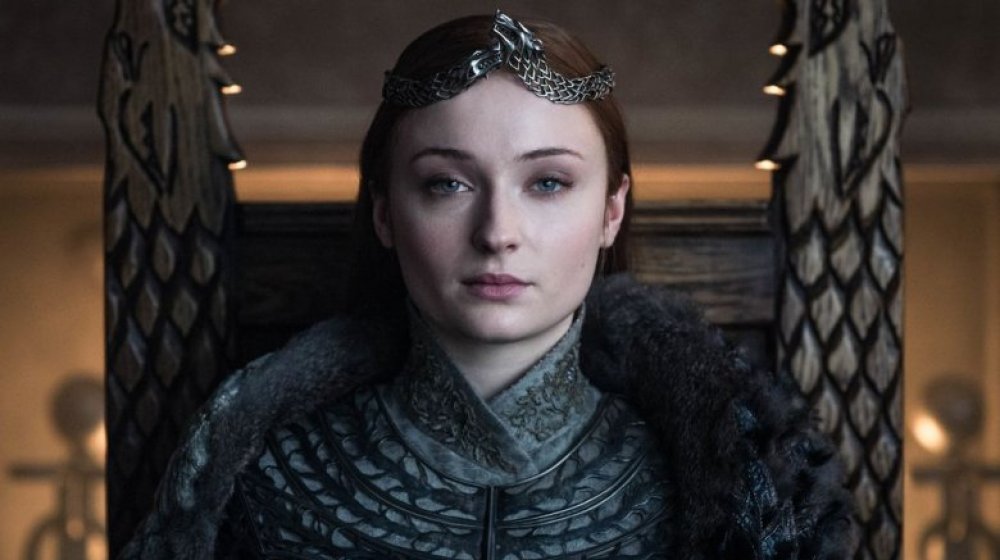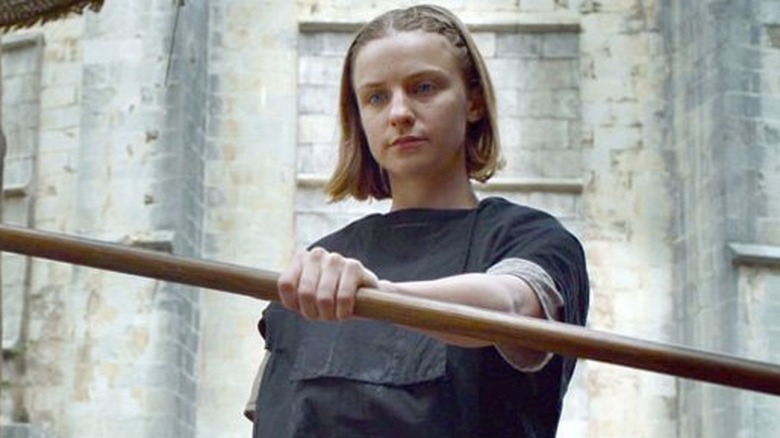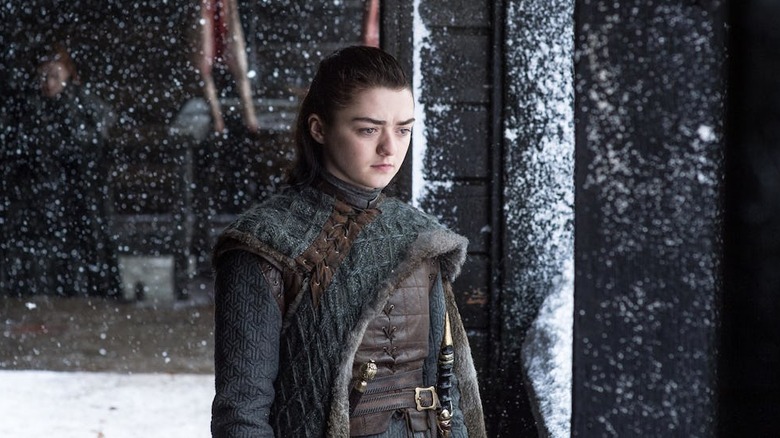Things That Make No Sense In Game Of Thrones
After eight seasons and almost 10 years spent dominating pop culture, HBO's behemoth fantasy series Game of Thrones came to an end in the spring of 2019. Unfortunately, after years and years of buildup, intrigue, and drama, many fans agree that showrunners David Benioff and D.B. Weiss didn't exactly stick the landing. In a truncated eighth season that only ran for six episodes, Benioff and Weiss rushed to the finish line, leaving behind unanswered questions, providing unsatisfying conclusions, and throwing away years of character development, to the chagrin of their most loyal fans.
Thanks to this scattershot approach, Game of Thrones left behind a lot of odds and ends that simply don't make sense. But these confusing moments, character inconsistencies, and inaccuracies aren't exclusive to the final season. As great as Game of Thrones can be, even its biggest fans have to admit that from time to time, its many story arcs and mysteries simply don't add up. These are some of the most puzzling questions Game of Thrones left in its wake, that still have viewers scratching their heads. Spoilers for the entire series to follow!
Gendry's parentage never seems to matter
As Game of Thrones begins, King Robert Baratheon (Mark Addy) is still on the throne of Westeros. Right away, viewers learn about his famous conquest of the Seven Kingdoms with Ned Stark (Sean Bean) by his side. After overthrowing the raving King Aerys Targaryen, Robert became fiercely protective of his throne, seeking to kill any young Targaryen threats. In the aftermath of Robert's untimely death, his illegitimate successor, Joffrey Baratheon (Jack Gleeson), takes that mission several steps forward, ordering the systemic murder of Robert's many, many illegitimate children to ensure his own status as king.
Unfortunately for Joffrey, he misses one important son: Gendry (Joe Dempsie), a gifted young blacksmith. Gendry goes on to survive the entire series, but bafflingly, his Baratheon blood never proves to be climactic. Just before the end of the show, other characters acknowledge it, but in confusing ways: Daenerys Targaryen (Emilia Clarke) legitimizes him, making him Lord Gendry, despite the fact that doing so could challenge her own claim to the Iron Throne. If Gendry is the last remaining son of Robert Baratheon, why does Daenerys go so far as to give him more of a right to rule Westeros?
The meaning of the bells changes
One of the most famously infuriating moments in Thrones' final season is Daenerys' silent, lightning-fast decision to slaughter thousands of innocents in King's Landing. This twist is problematic for any number of reasons, but one small part of the entire situation really doesn't make sense. As Daenerys and her team prepare to attack King's Landing and Queen Cersei Lannister (Lena Headey), Cersei's brother and Daenerys' right-hand man Tyrion (Peter Dinklage) tells the Targaryen heir that when she hears the bells ring in Westeros' capital city, she must back off. As he explains, the bells mean surrender.
This would be all well and good if Thrones hadn't told us that the bells mean exactly the opposite several seasons earlier. During another crucial battle set at King's Landing, chronicled in season two's "Blackwater," Varys (Conleth Hill) tells Tyrion that the bells ring for "horror," typically related to war. Did the meaning of the bells actually change between seasons two and eight, or did the showrunners just kind of forget?
The magically multiplying Dothraki hordes
Daenerys begins the show as the khaleesi of a wild Dothraki horde. After losing and gaining control of these proud horse lords many times over, she eventually makes her way to Westeros with a massive Dothraki army at her back. After losing one of her dragons to the Night King, Daenerys finds herself at a major disadvantage as the White Walkers head towards Westeros. As the battle begins, seemingly most, if not all of her Dothraki warriors charge ... and are immediately snuffed out by the army of the dead. A dramatic overhead shot even shows them being swallowed whole by darkness.
However, just a few episodes later, after Daenerys overtakes King's Landing, the camera pans across what looks like thousands of Dothraki warriors, enthralled by her speech about conquering the world. How is this possible? Benioff himself said that the Battle of Winterfell was "essentially the end of the Dothraki," so unless a secret Dothraki power is that they can magically multiply, how does Daenerys have so many horse lords left after that frigid battle?
One king to rule them all
In the series finale, Tyrion is given (for some reason) free reign to choose the next monarch. He decides that Bran Stark (Isaac Hempstead Wright), who has "the best story," should be crowned Bran the Broken, and rule the Seven Kingdoms.
Putting aside the issue of whether or not Bran actually does have "the best story," this choice makes little sense. Bran has become the inhuman and omniscient Three-Eyed Raven: As he has made clear, he cares about little, including the throne. How well did an indifferent king turn out with Robert Baratheon? The fact that Bran is a nonsensical choice for king — in fact, he'd be better as an Archmaester — is made worse when you realize that a much better candidate is seated next to him: His sister, Sansa (Sophie Turner). After Game of Thrones spent years signaling that a great leader would be honorable as well as cunning, why does Sansa, who is both, get a junior queenship while her brother gets the real prize?
The White Walkers never get to finish their story
Right from the beginning, Game of Thrones' biggest mystery concerned the White Walkers, an undead race of beings who live in the far north beyond the Wall. The White Walkers and their leader, the Night King, pose an enormous threat to all of Westeros: As early as the pilot, it's clear that the army of the dead will eventually make its way to the Seven Kingdoms and wage devastating war.
Throughout the series, viewers get small pieces of information about the Walkers, including that they are given babies as offerings from humans who live north of the Wall, who they turn into tiny Walkers. However, in the season eight episode "The Long Night," when the Walkers finally make their way to Winterfell, Arya Stark (Maisie Williams) dispatches the Night King himself without too much trouble. The mysteries surrounding the White Walkers die with him and his entire army. What did the White Walkers really want? They have unique clothing and tools, the markers of civilization — what did theirs look like, far in the frozen north? And why wasn't any of this properly explained?
The mission to capture a wight was doomed from the start
In the seventh season, several of Daenerys' allies go on an incredibly ill-advised mission north of the Wall to try and prove to Cersei that the White Walkers are real. Typically, only Northern folk are aware of the Walkers, and Southerners, like Cersei in King's Landing, consider them to be a myth. Thus, Tyrion proposes capturing a single wight and bringing it to show Cersei.
However, this plan is indescribably foolish right from the start, and "smart" characters like Tyrion, who somehow comes up with the plan in the first place, should know better. First of all, wights rarely travel alone, so trying to capture a single wight and return it in one piece immediately seems like a doomed mission. Furthermore, Cersei, famously the most self-obsessed woman in Westeros, certainly won't have any interest in this discovery, which Tyrion and company clearly think will be some sort of bombshell. Sure, Cersei is shocked by the wight when she sees it, but she wages war against them anyway, and all that Daenerys' squad has to show for their trouble is a stray wight and a felled dragon.
The White Walkers' swimming prowess isn't possible
After Daenerys swoops in to rescue Jon, Tyrion, and the rest of the gang, she suffers a major loss when the Night King takes careful aim and shoots one of her dragons, Viserion, out of the sky. Daenerys leaves with her two remaining dragons, Drogon and Rhaegal, but the loss is deeply felt. Matters only get worse when we see the Night King reanimate the dragon for his own nefarious purposes.
The image of Viserion's eye reopening with its new blue hue is definitely one of Thrones' coolest visuals, but the mechanics of how the Night King and his army retrieve the dragon from underneath the ice of the far North definitely raises some questions. Earlier in that same episode, the wight-capturers keep Walkers at bay by isolating themselves on a rock surrounded by water, as wights can't swim. If that's so, how did they retrieve Viserion? Beyond that, the army of the dead uses enormous chains to drag Viserion to the surface: Where did they get those, and how did they attach them to the dragon underwater? Are we to understand that not only does the far North have a secret foundry, but that some of the Walkers are Olympic-level swimmers?
A rip in Westeros' space-time continuum
Game of Thrones' earliest episodes offer plenty of obstacles for characters to overcome. One of the most difficult is travel: Westeros is huge. For that reason, early seasons of Game of Thrones are more or less devoted to long character journeys, making it clear that people like Daenerys, who is trying to cross the Narrow Sea and get to Westeros, have a long way to go.
However, as the show continued, writers and directors focused less on Westeros' sprawling landscape, to the point where the basic rules of time and space seemed to stop mattering entirely. Journeys that would have once taken a season and a half eventually only take a couple of minutes. Characters like Gendry, who apparently developed super-speed off screen, can run from a mountaintop north of the Wall to send a raven to Daenerys, who arrives on a dragon shortly thereafter. Suspension of disbelief is fine for a show that involves dragons and magic, but Game of Thrones' space-time continuum develops not just a tear, but some pretty enormous holes.
Prophecies and priestesses eventually mean nothing
In Game of Thrones' second season, viewers meet Melisandre (Carice van Houten), a cryptic priestess of R'hllor, the Lord of Light. Initially, Melisandre, who serves Stannis Baratheon (Stephen Dillane) until his death, is the only red priest viewers meet, but before long, others like Thoros of Myr (Paul Kaye) and a priestess who seeks out Daenerys in Meereen, appear. Beyond their fire-related powers, each of these mystical beings deliver prophecy, especially Melisandre, who makes sweeping proclamations about chosen ones and rightful kings pretty regularly.
These prophecies are all exciting in the beginning, but by the time Game of Thrones draws to a close, none of them have been fulfilled. The show's writers clumsily try to make one of Melisandre's predictions relate to Arya's slaughter of the Night King after the fact, but it doesn't really work. When all is said and done, Melisandre's predictions have little to no bearing on anything in the show's outcome and are never explained at all.
Bronn's misguided promotion
When it comes to fan-favorite characters, few are as popular as Bronn (Jerome Flynn), the wise-cracking mercenary who spends time with both Jaime and Tyrion Lannister throughout the series. Though Bronn is never one of the show's most vital characters, he's beloved, so it's no surprise that Thrones' writers kept him around.
But a bizarre plotline takes place during the eighth season, in which Bronn, who has proven time and time again that he truly cares about his relationships with both Tyrion and Jaime, agrees to kill them both simply because Cersei offered him money. He threatens the brothers with a crossbow, then isn't seen again until the finale. By then, Tyrion has made him Lord of Highgarden, which he promised Bronn in exchange for his and Jaime's lives, as well as Master of Coin to King Bran. This is a pretty big head-scratcher. Earlier in the series, Bronn says he's never borrowed money and doesn't know how it works, so making a man who can't figure out the concept of a loan the Master of Coin seems unwise. Minutes later, Bran observes that Westeros has no Master of War, so why wouldn't Bronn, a seasoned soldier, simply take that title instead?
No need for medical attention
Like all fantasy, Game of Thrones is home to plenty of moments that require viewers to put aside some of their logic and reason. But sometimes, Thrones asks too much of its fans, especially when it comes to injuries. After characters like Khal Drogo (Jason Momoa) die of actual afflictions like blood poisoning, you might think that a serious injury — say, a gaping stomach wound — might take a character down once in a while. But you would be wrong.
Both Jaime and Arya endure brutal stab wounds to the stomach during fights: Arya loses a tussle with the Waif (Faye Marsay) in season six, while Jaime struggles against Euron Greyjoy (Pilou Asbæk) in the final season. And yet, neither person seems much troubled by these grievous injuries. Jaime makes it into the Red Keep to find Cersei, only to die by her side as the building crumbles, while Arya somehow leaps into a (probably filthy) canal, swims across Braavos, and is eventually cured by a cup of soup and a good night's sleep. Armor can be effective against knives, but apparently, being a series regular can save you from multiple stomach wounds as well.
Melisandre's magical inconsistencies
Beyond her disappearing and ultimately unhelpful prophecies, Melisandre does a fair amount of magic on Game of Thrones, much of which concerns blood sacrifices. To help Stannis gain the throne, she sacrifices his followers and former countrymen to the flame. She later steals "king's blood" from Gendry, using leeches to sap him for a ritual that will destroy any usurpers to the Iron Throne. In her worst moment, Melisandre even convinces Stannis to burn his own daughter, Shireen (Kerry Ingram), alive, in an attempt to win the War of the Five Kings. Shireen dies screaming, her mother hangs herself, and Stannis loses anyway.
With all that in mind, many viewers were terrified of who or what Melisandre would sacrifice in the show's sixth season, after she revives a murdered Jon Snow. This time, however, Melisandre doesn't have to sacrifice anyone — she just brings Jon back from the dead. If she's capable of resurrection, maybe her greatest magical feat, with nothing but her own power, why did she have to kill all those other people? What, exactly, are the laws governing her abilities?
Daenerys' love life is a bit of a mess
Though Daenerys begins the show as a naive child bride, marrying Khal Drogo at her brother's behest so that he can gain power, she quickly comes into her own. Tragically, Drogo sustains an infected wound, and despite her best efforts, the dragon queen can't keep her husband from a grisly death. Bereaved but newly self-confident, Daenerys sets her sights on Westeros, putting her romantic life on the backburner.
Though Daenerys takes a few lovers, including Daario Naharis (Michiel Huisman), she never truly falls in love again ... until Jon Snow arrives, and the two fall head over heels for each other. Putting their lackluster chemistry aside — as well as the fact that they're actually aunt and nephew — Daenerys risking her quest for the Iron Throne over a lover is wildly inconsistent with her character. Seriously, can you imagine the steely Daenerys who took Meereen putting her title in jeopardy for a dude she's known for a few months? It doesn't make sense ... until you consider that, as a plot device, it forces Jon to face some internal conflict about killing the woman who's not just his queen, but his lover.
Sam's survival skills don't add up
Samwell Tarly (John Bradley) might be one of Game of Thrones' most lovable characters, but he's definitely not the toughest fighter ... which makes a scene from the second season's finale truly baffling. While out in the far North with a few other men from the Night's Watch, Sam and his black-clad brothers hear a horn sound three times, indicating that White Walkers have been spotted. While Sam's compatriots make a run for it, he can't catch up, and so he hides behind a rock in the middle of a huge open space.
This leads to a thrilling scene in which Sam watches an entire army of Walkers make their way towards the Wall, but it also raises a ton of questions. How could Sam, arguably the slowest Night's Watchman, survive this encounter? Not only would he not be able to get ahead of the army, but a high-ranking Walker atop an undead horse makes prolonged eye contact with him. The White Walkers will kill anything in their path: Besides the fact that he's a main character, why is Sam any different?
Ned's lie went a little too far
When audiences first meet Jon Snow and Ned Stark, they're told that Jon is Ned's shameful illegitimate son, the product of an affair with a tavern wench. But as these earliest episodes make clear, Ned prizes his honor above all else, making the entire situation seem a little shady. Ultimately, the truth is revealed; Jon is actually the legitimate product of Ned's sister Lyanna Stark and Daenerys' brother Prince Rhaegar Targaryen, who married in secret.
As Lyanna lay dying with Robert Baratheon's forces approaching, she begged her brother to keep Jon's real identity a secret, which would save him from Robert's sword. This is true enough — but the lengths to which Ned goes to keep this secret are extreme. For years, Ned's loving wife Catelyn (Michelle Fairley) resents Jon as shameful proof of her husband's infidelity. Couldn't Ned have told his wife the real story? Yes, Lyanna made Ned swear that he would never tell anyone, but Catelyn is as trustworthy as they come, and her treatment of Jon leaves lifelong scars on both the boy and the Stark marriage. Enabling that doesn't actually seem more honorable than confiding in the one person meant to share his life's burdens — really, practical and courageous Catelyn could have helped him keep the secret more securely.
Jon's happy ending has no purpose
Game of Thrones is an emotional rollercoaster for pretty much every character, but Jon Snow has one of the toughest journeys of all. Yet somehow, he ends up with a reasonably happy ending. After helping Daenerys conquer King's Landing, he realizes that his queen and lover has turned evil in her quest for power. In the aftermath of her massacre of King's Landing's civilians, he stabs her for the good of the realm. Though Daenerys' loyal soldiers are furious, a deal is reached, and in the end, Jon is banished back to the Night's Watch, landing him right back where he began.
Jon is always happiest when he's north of the Wall, so at face value, this seems like a perfect ending for a tormented character. However, there's a catch: The Night's Watch no longer have any reason to exist. While the White Walkers still roamed the far north, the Night's Watchmen protected the Wall and the realm, but without them, there's nothing for the Night's Watch to do. It's a neat ending to send Jon back to his brothers in black, but it also makes absolutely no sense. What are they going to do all day?
Nothing about Euron Greyjoy makes sense
Putting aside the fact that Euron Greyjoy is undoubtedly one of the most irritating characters in recent television history (we get it, writers, he's crass), pretty much everything he does in the final two seasons of Game of Thrones makes no sense. As Thrones' final conflict draws near, Euron's niece and nephew, Yara (Gemma Whelan) and Theon (Alfie Allen), steal his best ships. Though Euron whines quite a lot about how their home of the Iron Islands has terrible resources, he still manages to build 1,000 ships in pretty quick order, without much fuss.
From there, Euron apparently gains perfect aim overnight, taking down one of Daenerys' typically impervious dragons with a perfect shot — from a moving ship, no less. He sends Rhaegal tumbling into the sea, leaving Daenerys with just one dragon. He's a crude idiot at multiple major disadvantages, yet none of them seem to actually matter. In a show that prides itself on taking fantasy tropes seriously, especially in terms of mundane realities like war, Euron Greyjoy stands out like a bizarrely lucky sore thumb.
Tywin Lannister's brilliance has its limits
Out of all the characters on Game of Thrones, there's little doubt that Tywin Lannister (Charles Dance), who sticks around for four seasons, is probably the smartest man in all of Westeros. A brilliant strategist both on and off the battlefield, Tywin is a political master who stops at nothing in his quest to elevate the Lannisters. This makes one of his personal relationships extraordinarily confusing.
During the show's second season, while Arya is on the run from King's Landing in the wake of her father's execution, she ends up being Tywin's cupbearer at Harrenhal. The two strike up a solid rapport, especially when Tywin realizes that she's clearly well-educated. However, that fact alone should have pretty much revealed Arya's identity: Tywin knows that one of the two Stark girls has escaped, and Arya's knowledge betrays her highborn status almost immediately. Tywin may be the cleverest man in Westeros, but apparently, even his considerable brain has its limits.
Dragonstone sits empty for way too long
It takes Daenerys until the start of Thrones' seventh season to arrive in Westeros. When she does, she makes a triumphant return to Dragonstone, her ancestral home, which was most recently occupied by Stannis Baratheon and his forces. In a near-silent scene that closes the seventh season's premiere, Daenerys strides across a shore she barely remembers, flanked by her closest advisors. At last, she's finally ready to take on her Westerosi foes.
However, there's one thing about this scene, triumphant as it may be, that doesn't add up. After Stannis' death, why didn't anyone acquainted with the Lannister forces even bother trying to take Dragonstone? As a coastal stronghold, it would have been wise for Daenerys' enemies to send even just a few soldiers to protect the place where she was born, especially because they likely knew she would return. Watching Daenerys arrive at Dragonstone is a touching moment, but it's also the result of some pretty weak military strategy.
Cersei's children don't add up
Cersei might be a conniving, vicious, and vindictive power player throughout Thrones, but she does truly love her children. Aside from Joffrey, watching her lose her two younger children in incredibly tragic ways almost makes you pity the villainess. However, we know long before her last child dies that losing children was her destiny. In the fifth season's premiere, a young Cersei meets a witch who tells her that she will have three children, and that their crowns and shrouds will both be golden.
Yet in the show's second episode, Cersei tells Catelyn Stark that she once had a brown-haired baby — presumably, the only baby she had with Robert Baratheon. But that would mean she had four children, making this otherwise correct prophecy suddenly null and void. This prophecy appears in George R.R. Martin's books as well, which makes this particular discrepancy all the more confusing.
Goals of independence get forgotten
In the series' final episode, the lords and ladies of Westeros come together to find a new ruler and rebuild their government after Daenerys' death. Bran is chosen as the next King of the Seven Kingdoms, but before anyone can celebrate, his sister Sansa makes an important request. Before Bran is officially crowned, Sansa asks that the North, which has always belonged to the Starks, maintain its independence. Bran agrees, and eventually, Sansa is crowned Queen in the North.
Clearly, this is a good move for Sansa, but it's pretty strange that neither Yara Greyjoy, who has been angling for the Iron Islands' independence, nor the unnamed prince of Dorne, a region with a long history of independence from the other kingdoms, asks for the same thing. Sansa gets what she wants — so why don't they ask too? It makes absolutely no sense that these two other power players just sit there, ask for nothing, and accept the fact that their precious kingdoms remain under Bran's rule.
The Waif's purpose was always unclear
During Thrones' fifth and sixth seasons, Arya undergoes a massive transformation when she trains at the House of the Undying in Braavos. It is here where she learns to be a faceless assassin, and the mysterious girl known as the Waif plays a huge role in it. As the apparent right-hand woman to Jaqen H'ghar (Tom Wlaschiha), the Waif despises Arya, beating her without mercy after Arya loses her sight, and eventually trying to assassinate the youngest Stark daughter outright.
Aside from setting up conflict for Arya, however, there's not really much reason for the Waif to exist, and her presence, as well as her animosity towards Arya, goes completely unexplained for the entire series. Once Arya leaves Braavos, we never see either Jaqen or the Waif again, and it's even more unclear as to why the Waif ever existed. Why is the Waif even there, why does she hate Arya so much, and what exactly is the point of her character overall?
Arya's mission goes unfinished
After learning to assume other people's faces and stealthily murder her enemies in Braavos, Arya quickly proves herself to be a formidable assassin, taking down those who have wronged her and her family as soon as she arrives in Westeros. For years, however, one enemy looms above all the rest: Cersei Lannister. It seems like a foregone conclusion for much of the series that Arya will be the one to kill Cersei.
However, when push comes to shove, Arya does not kill Cersei. She comes incredibly close to accomplishing her mission — but then, the Hound warns her that killing Cersei will end up killing her as well, as the Red Keep is on the verge of collapse. Somehow, that one sentence works, and Arya turns back. This seems pretty illogical, considering that Arya, the insanely brave killer of the Night King, once murdered the entirety of House Frey, even feeding some of them to Lord Walder Frey in a pie. Cersei's death is disappointing anyway — it doesn't help that it fails to bring Arya's story to a close.
